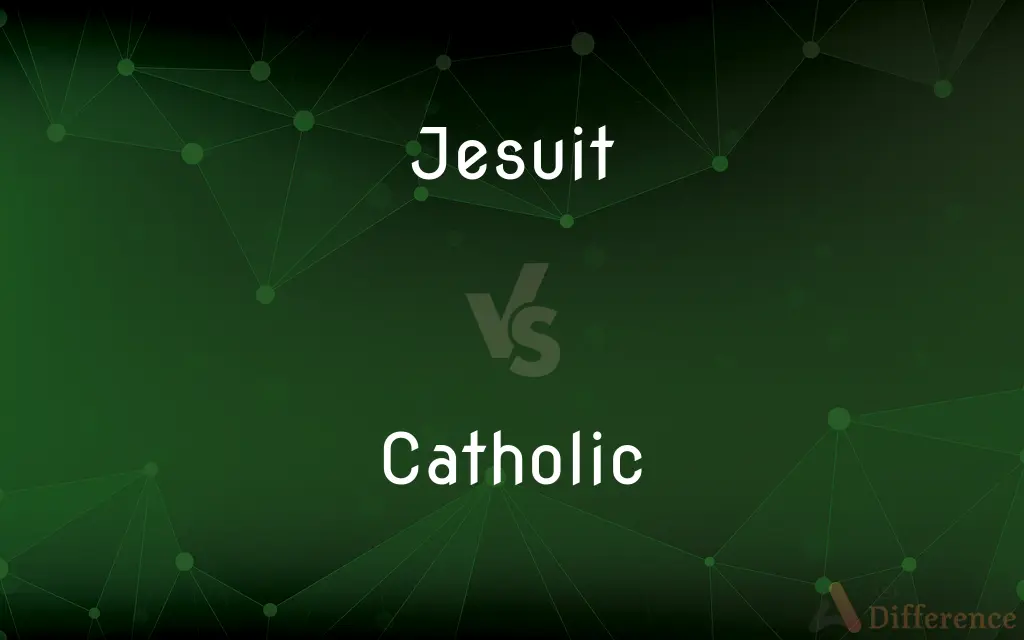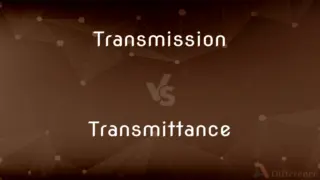Jesuit vs. Catholic — What's the Difference?
Edited by Tayyaba Rehman — By Fiza Rafique — Updated on October 1, 2023
Jesuits are members of the Society of Jesus, a Catholic religious order, while Catholicism represents the entire global Christian church in communion with the Pope. Jesuits are Catholics, but not all Catholics are Jesuits.

Difference Between Jesuit and Catholic
Table of Contents
ADVERTISEMENT
Key Differences
Jesuit and Catholic are terms associated with the Christian faith, particularly the Roman Catholic Church. The term "Catholic" refers to the universal Christian church that recognizes the Pope as its spiritual leader. It encompasses various religious orders, dioceses, and traditions worldwide. In contrast, the term "Jesuit" specifically refers to a member of the Society of Jesus, which is a religious order within the Catholic Church.
While all Jesuits are Catholic, not all Catholics are Jesuits. Jesuits follow the teachings of St. Ignatius of Loyola, the founder of the Society of Jesus. Their order has a particular emphasis on education, missionary work, and social justice. Catholics, as a broader group, come from various backgrounds and may be affiliated with different religious orders or no order at all.
The Society of Jesus, or Jesuits, was founded in the 16th century and has played a significant role in the Catholic Church's missionary and educational endeavors. Jesuit institutions, like universities and high schools, are well-known for their academic rigor and commitment to social justice. On the other hand, Catholic institutions, in general, may include parishes, dioceses, and a range of religious orders with varied missions.
To summarize, while both Jesuit and Catholic identities are intertwined with the Roman Catholic Church, they highlight different facets of the faith. Jesuits represent a specific religious order with distinct principles and objectives, while the term Catholic represents the broader church community in communion with the Pope.
Comparison Chart
Definition
Member of the Society of Jesus
Member of the global Christian church under the Pope
ADVERTISEMENT
Scope
Specific religious order
Universal church
Founder
St. Ignatius of Loyola
Jesus Christ (as believed by Catholics)
Associated Activities
Education, missionary work, social justice
Worship, sacraments, charity, various ministries
Representation
Part of the Catholic Church
Encompasses entire church including all orders
Compare with Definitions
Jesuit
A Catholic religious order focused on education.
The Jesuit school was renowned for its rigorous curriculum.
Catholic
Recognizing the Pope as the spiritual leader.
The Catholic Church is headquartered in the Vatican.
Jesuit
Follower of the teachings of St. Ignatius of Loyola.
As a Jesuit, he practiced the Ignatian spiritual exercises.
Catholic
Universal; concerning the entire church.
The Catholic faith has believers from all continents.
Jesuit
Associated with the Counter-Reformation.
Jesuit priests played a key role during the Counter-Reformation.
Catholic
Rooted in apostolic succession and tradition.
Catholic teachings emphasize both Scripture and Tradition.
Jesuit
A member of the Society of Jesus.
He became a Jesuit after years of discernment.
Catholic
Of the Roman Catholic faith.
Jesuit
Roman Catholic Church A member of the Society of Jesus.
Catholic
A member of the Roman Catholic Church.
Jesuit
Often jesuit One given to subtle casuistry.
Catholic
Of broad or liberal scope; comprehensive
"The 100-odd pages of formulas and constants are surely the most catholic to be found" (Scientific American).
Jesuit
One of a religious order founded by Ignatius Loyola, and approved in 1540, under the title of The Society of Jesus.
Catholic
Including or concerning all humankind; universal
"what was of catholic rather than national interest" (J.A. Froude).
Jesuit
Fig.: A crafty person; an intriguer.
Catholic
Of or involving the Roman Catholic Church.
Jesuit
A member of the Jesuit order
Catholic
Of or relating to the universal Christian church.
Jesuit
Having qualities characteristic of Jesuits or Jesuitism;
Jesuitical education
Catholic
Of or relating to the ancient undivided Christian church.
Jesuit
Known for missionary work and social justice.
The Jesuit mission in the region focused on helping the marginalized.
Catholic
Of or relating to those churches that have claimed to be representatives of the ancient undivided church.
Catholic
A member of a Catholic church, especially a Roman Catholic.
Catholic
Universal; all-encompassing.
Catholic
Alternative case form of Catholic.
Catholic
(obsolete) Common or prevalent; especially universally prevalent.
Catholic
Embracing all.
Catholic
Universally applicable.
Catholic
Of universal human interest or use.
Catholic
(slang) Permissive of unprotected sex.
Catholic
Universal or general; as, the catholic faith.
Men of other countries [came] to bear their part in so great and catholic a war.
Catholic
Not narrow-minded, partial, or bigoted; liberal; as, catholic tastes.
Catholic
Of or pertaining to, or affecting the Roman Catholics; as, the Catholic emancipation act.
Catholic
A person who accepts the creeds which are received in common by all parts of the orthodox Christian church.
Catholic
An adherent of the Roman Catholic church; a Roman Catholic.
Catholic
A member of a Catholic church
Catholic
Of or relating to or supporting Catholicism;
The Catholic Church
Catholic
Free from provincial prejudices or attachments;
Catholic in one's tastes
Catholic
A member of the universal Christian church under the Pope.
She's a devout Catholic who attends Mass weekly.
Catholic
Pertaining to the Roman Catholic Church.
The Catholic tradition includes seven sacraments.
Common Curiosities
Is the Pope always Catholic?
Yes, the Pope is always Catholic as he is the spiritual leader of the Catholic Church.
Do Jesuits have their own churches?
Yes, there are Jesuit-run churches, but they are part of the broader Catholic Church.
Why are Jesuits sometimes called "God's Marines"?
Due to their missionary work and commitment to going wherever the Church needs them.
Are Jesuit schools only for Jesuits?
No, Jesuit schools and universities educate a diverse group of students, not just Jesuits.
Are all Jesuits Catholic?
Yes, all Jesuits are Catholic, but not all Catholics are Jesuits.
What's the main focus of Catholic teachings?
Catholic teachings focus on the life and teachings of Jesus Christ, the sacraments, and apostolic tradition.
Can a Jesuit become a Pope?
Yes, for instance, Pope Francis is the first Jesuit Pope.
What differentiates Jesuits from other Catholic orders?
Jesuits are known for education, missionary work, and social justice, following St. Ignatius of Loyola's teachings.
Who founded the Jesuit order?
St. Ignatius of Loyola founded the Society of Jesus or Jesuits.
How old is the Catholic Church?
The Catholic Church traces its origins back to Jesus Christ, over 2,000 years ago.
What is the Jesuit motto?
The Jesuit motto is "Ad Maiorem Dei Gloriam" (For the Greater Glory of God).
How does one become a Catholic?
One becomes Catholic through the sacraments of initiation: Baptism, Confirmation, and the Eucharist.
Is the Catholic Church the oldest Christian church?
Yes, the Catholic Church believes it holds an unbroken line since the time of the apostles.
Is Catholicism only in Rome?
No, Catholicism is global, but the Vatican in Rome is its spiritual and administrative center.
Do Jesuits believe in the Bible?
Yes, Jesuits, like all Catholics, believe in and uphold the teachings of the Bible.
Share Your Discovery

Previous Comparison
Transmission vs. Transmittance
Next Comparison
Route vs. RoutineAuthor Spotlight
Written by
Fiza RafiqueFiza Rafique is a skilled content writer at AskDifference.com, where she meticulously refines and enhances written pieces. Drawing from her vast editorial expertise, Fiza ensures clarity, accuracy, and precision in every article. Passionate about language, she continually seeks to elevate the quality of content for readers worldwide.
Edited by
Tayyaba RehmanTayyaba Rehman is a distinguished writer, currently serving as a primary contributor to askdifference.com. As a researcher in semantics and etymology, Tayyaba's passion for the complexity of languages and their distinctions has found a perfect home on the platform. Tayyaba delves into the intricacies of language, distinguishing between commonly confused words and phrases, thereby providing clarity for readers worldwide.
















































